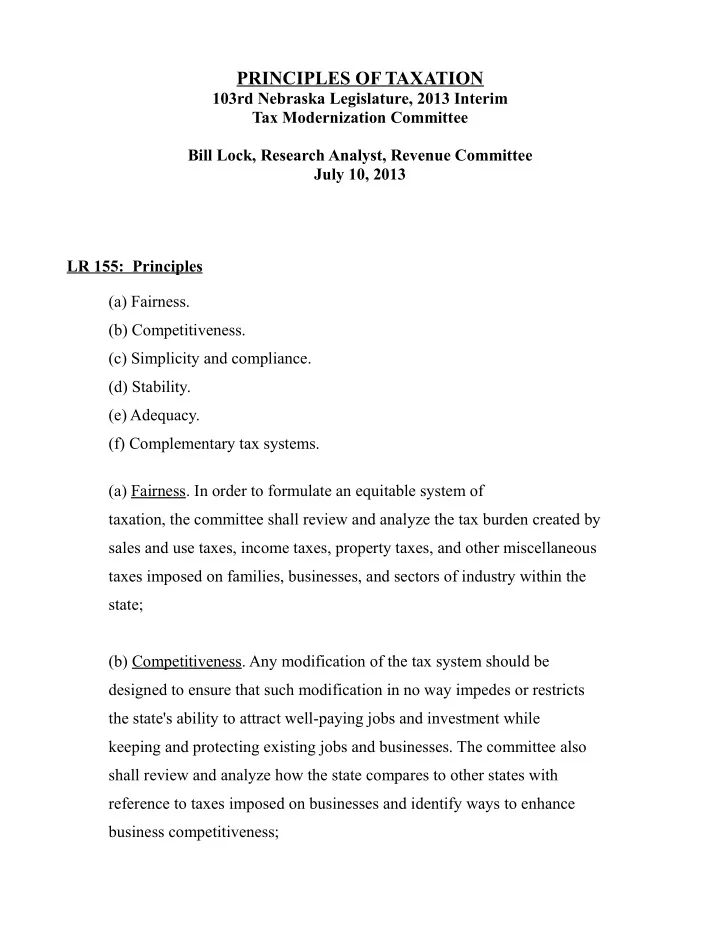

PRINCIPLES OF TAXATION 103rd Nebraska Legislature, 2013 Interim Tax Modernization Committee Bill Lock, Research Analyst, Revenue Committee July 10, 2013 LR 155: P rinciples (a) Fairness. (b) Competitiveness. (c) Simplicity and compliance. (d) Stability. (e) Adequacy. (f) Complementary tax systems. (a) Fairness. In order to formulate an equitable system of taxation, the committee shall review and analyze the tax burden created by sales and use taxes, income taxes, property taxes, and other miscellaneous taxes imposed on families, businesses, and sectors of industry within the state; (b) Competitiveness. Any modification of the tax system should be designed to ensure that such modification in no way impedes or restricts the state's ability to attract well-paying jobs and investment while keeping and protecting existing jobs and businesses. The committee also shall review and analyze how the state compares to other states with reference to taxes imposed on businesses and identify ways to enhance business competitiveness;
(c) Simplicity and compliance. The tax system should be easy to understand and comply with. The committee shall formulate recommendations designed to ensure ease of compliance for individuals and businesses and efficient administration by the state; (d) Stability. A stable tax system generates revenue that is relatively dependable and not prone to unpredictable fluctuations. The committee shall ensure that any recommended changes will maintain or improve stability; (e) Adequacy. The tax modernization process should create a tax system that generates adequate revenue to fund essential state services and obligations. The tax structure should ensure that revenue will meet spending needs; and (f) Complementary tax systems. Updating of the tax system should address the interrelationships among tax systems within the state revenue system as a whole. National Conference of State Legislatures: Principles of a High-Quality Revenue System 1. A high-quality revenue system comprises elements that are complementary, including the finances of both state and local governments. Page 2
2. A high-quality revenue system produces revenue in a reliable manner. Reliability involves stability, certainty and sufficiency. 3. A high-quality revenue system relies on a balanced variety of revenue sources. 4. A high-quality revenue system treats individuals equitably. Minimum requirements of an equitable system are that it imposes similar tax burdens on people in similar circumstances, that it minimizes regressivity, and that it minimizes taxes on low-income individuals. 5. A high-quality revenue system facilitates taxpayer compliance. It is easy to understand and minimizes compliance costs. 6. A high-quality revenue system promotes fair, efficient and effective administration. It is as simple as possible to administer, raises revenue efficiently, is administered professionally, and is applied uniformly. 7. A high-quality revenue system is responsive to interstate and international economic competition. 8. A high-quality revenue system minimizes its involvement in spending decisions and makes any such involvement explicit. 9. A high-quality revenue system is accountable to taxpayers. Page 3
Nebraska Constitution: Select Provisions or Principles Article III - 18 The Legislature shall not pass special laws. Article III - 24 Limitation on games of chance; authorization of parimutuel wagering on horse racing. Article IV - 28 Appointment and jurisdiction of Tax Commissioner; creation of State Board of Equalization and Assessment with power to review and equalize assessments of property for taxation within this state. (Amended in 1996 to provide for creating a Tax Equalization and Review Commission. ) Article VII - 1 The Legislature shall provide for the free instruction in the common schools of the state. Article VIII - 1 Authorization of taxation. Taxes shall be levied by valuation uniformly and proportionately upon all tangible property and franchises; permissive exceptions for motor vehicles, agricultural land, and livestock; authorization for taxation of intangible property; and authorization for taxation other than property taxation. Article VIII - 1 A. Prohibition against the state levying a property tax for state purposes. Article VIII - 1 B. Authorization of an income tax based upon law of the United Page 4
States. Article VIII - 2 Mandatory exemption from taxation of property owned by the state or its governmental subdivisions; permissive exemptions of certain enumerated property from taxation. The Legislature may classify personal property, and may exempt any class or all personal property from taxation. No property shall be exempt from taxation except as provided by Constitution. Article VIII -2A Permissive exemption of goods held in freeport warehouse. Article VIII - 3 Prohibition against the release, discharge, or commutation of the proportionate share of taxes levied for state purposes or due any municipal corporation. Article VIII -5 Limitation of county levy to no greater than 50 cents per 100 dollars of value Article VIII-10 Authorization to substitute valuation taxation on grain and seed produced or handled in this state, notwithstanding the other provisions of Article VIII. Article VIII -11 Requirement for in lieu of tax payment by public corporations or political subdivisions providing electricity or irrigation and electricity. Article XIII-1 State may contract debts; limitation; exceptions. Page 5
Recommend
More recommend